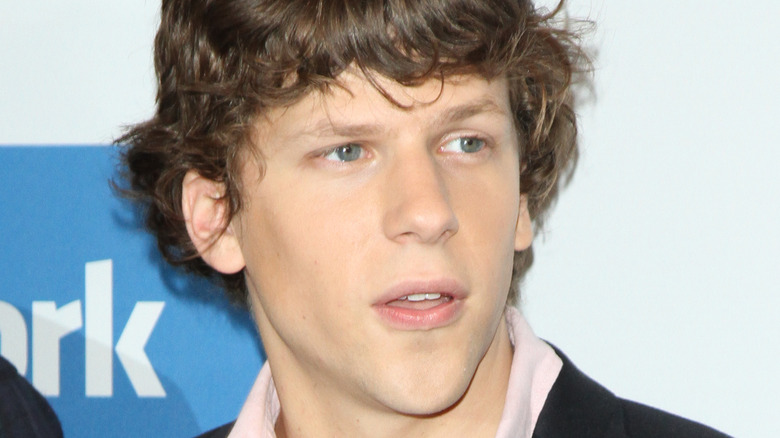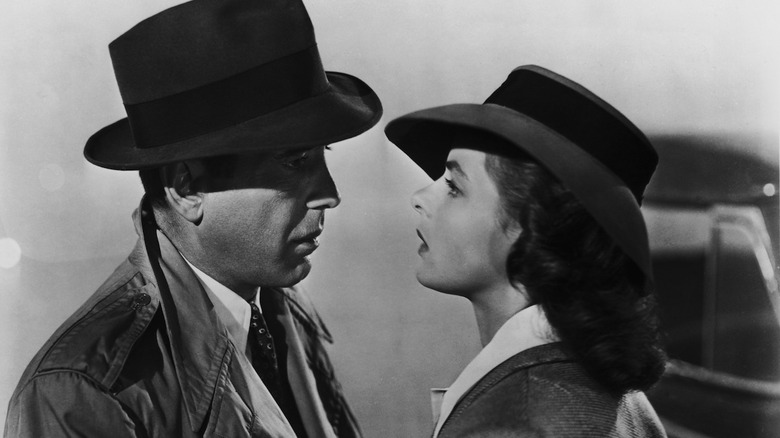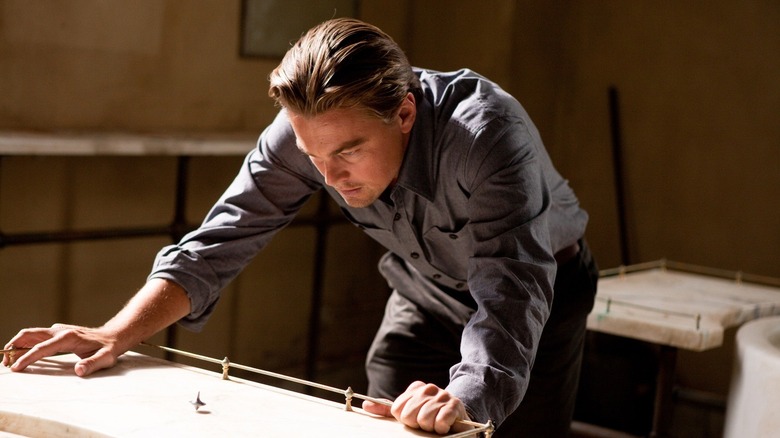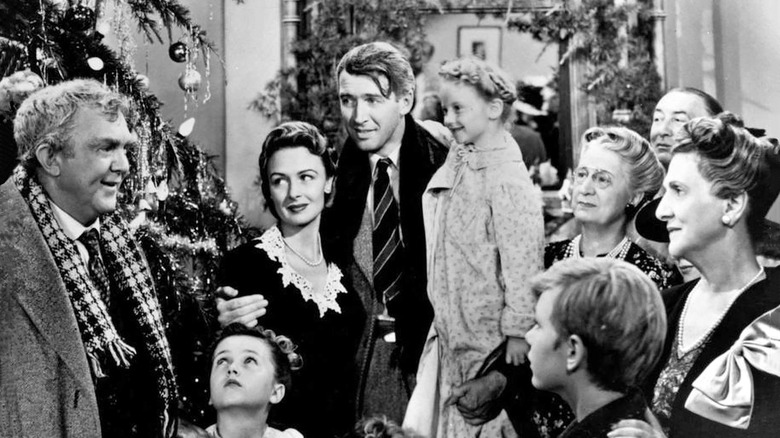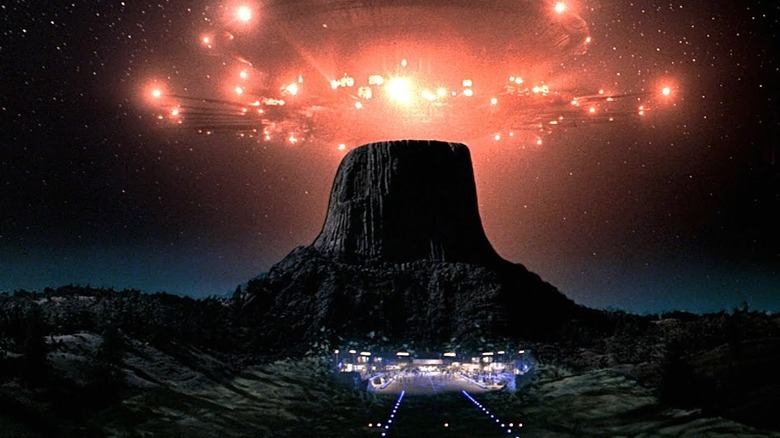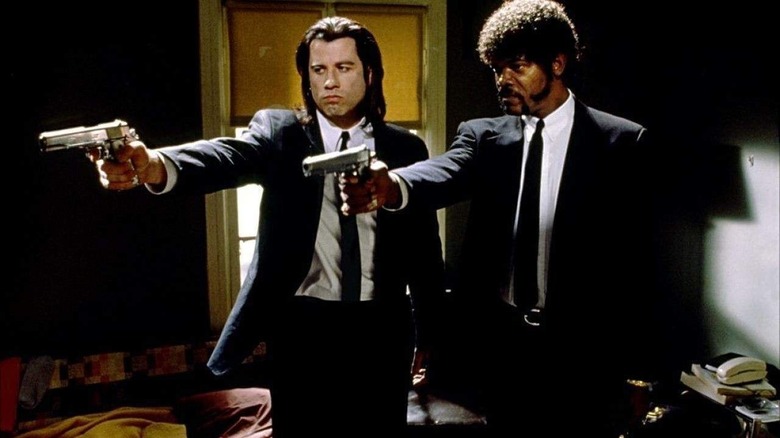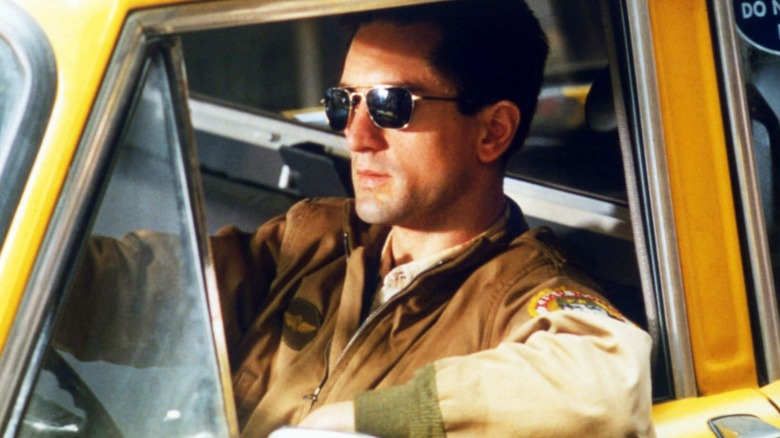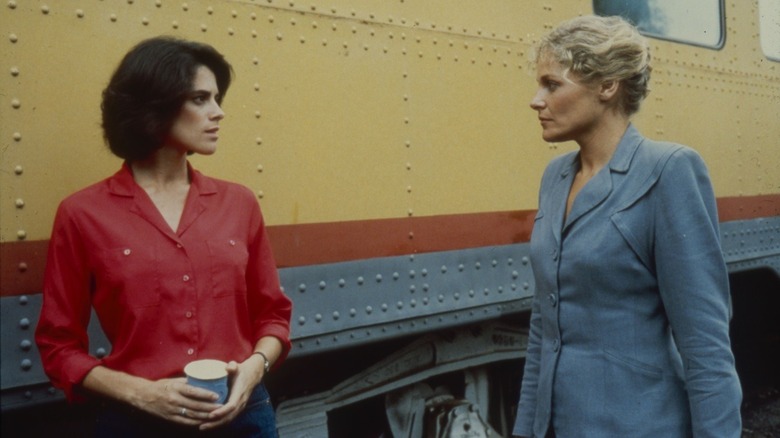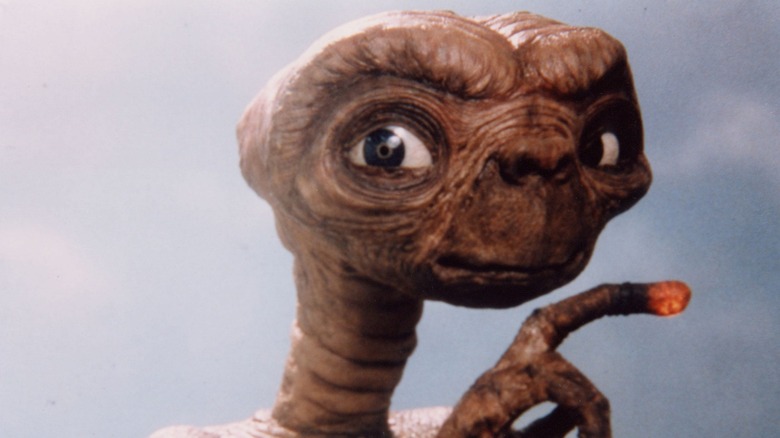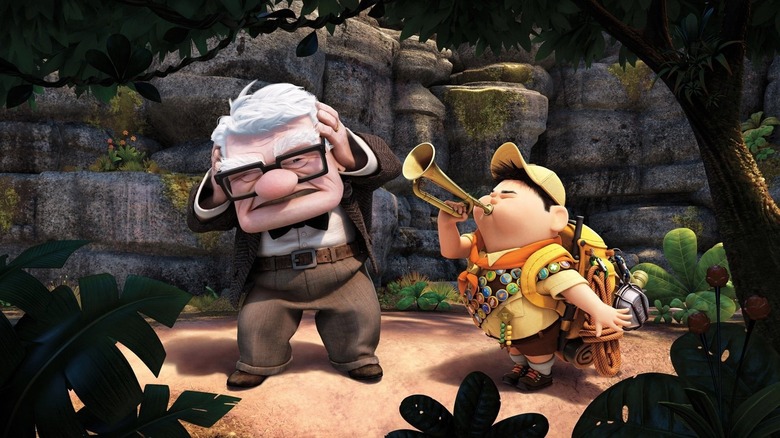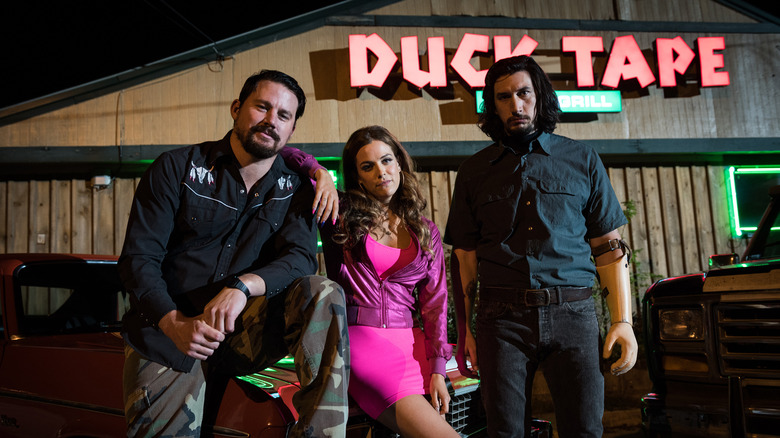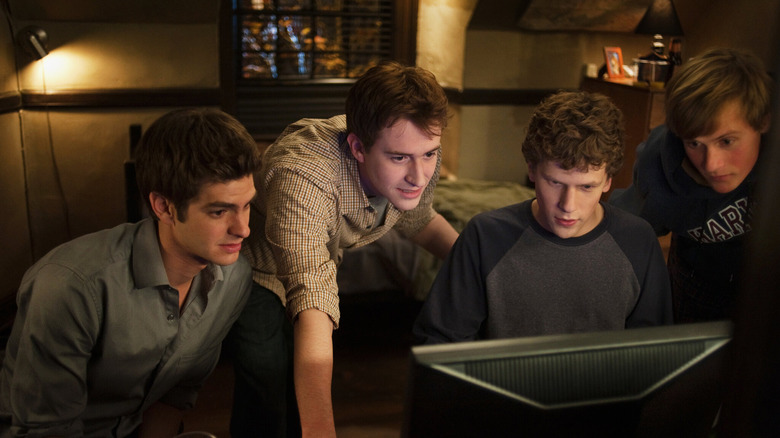Great Films We're Glad Never Got Sequels
Not every movie needs a sequel. It's a truism that's made all the more apparent by how many pointless sequels and franchise extensions Hollywood regularly churns out. How many beloved features have ended up having their reputation tainted because of a cash-grab follow-up? Even the 1975 masterwork "Jaws" has to deal with the fact that it spawned a trio of terrible sequels. Many motion pictures have fallen prey to this phenomenon thanks to how Hollywood, for almost its entire existence, has been prone to creating a sequel as an easy way to make money. But that doesn't mean every successful and beloved feature has garnered a sequel.
In fact, over the decades, several acclaimed movies have managed to avoid succumbing to the fate of spawning a needless sequel thanks to a variety of very specific factors. Sometimes, it can be as simple as just the creators getting too busy to make a sequel. In other cases, complex legal matters have ensured that certain masterpieces won't have to endure producers wrangling up an extraneous sequel. Whatever has prevented these follow-ups from existing, moviegoers the world over are grateful that the following top-notch movies have never scored a sequel.
Casablanca
While the ubiquity of sequels is a trend of modern Hollywood, it's not like the concept of sequels was invented in the 21st century. Case in point: shortly after the release of "Casablanca" in 1942, news broke that a sequel was being developed for the project. The film was to be called "Brazzaville" and would have featured Humphrey Bogart and Sydney Greenstreet reprising their respective roles from the original. Despite getting a splashy announcement, "Brazzaville" never became a reality.
In the years that followed, occasional whispers were heard about the prospect of a "Casablanca" sequel. After all, this is one of the best-known movies in history, with even 2021 films like "Space Jam: A New Legacy" making explicit references to it. A modern Hollywood landscape hungry for any and all recognizable brands would inevitably be salivating to exploit that. Most recently, in November 2012, the New York Post reported attempts to get Warner Bros. to produce a script for a "Casablanca" follow-up written back in the 1980s by Howard Koch, one of the architects of the original film.
Despite the recurring rumors of more "Casablanca" adventures, it's a relief to know none of them have ever come true. A "Casablanca" sequel made in the 1940s would've already been superfluous, but trying to make one in the modern day, with new actors trying to emulate untouchably iconic performances, sounds like a recipe for disaster.
Inception
When it hit theaters in July 2010, "Inception" became one of the highest-grossing movies ever domestically that wasn't attached to a piece of previously existing IP. With $292 million in North America alone, "Inception" was an unquestionable hit. Typically in Hollywood, that kind of success would mean one thing: a sequel. It's easy to imagine not just a follow-up but an entire cinematic universe emerging from the dense lore established by "Inception." Of course, such sequels would inevitably undercut the iconic ambiguous ending of "Inception," which leaves viewers wondering whether or not the film's lead character is trapped in a dream. Plus, it's hard to imagine sequels containing the level of captivating surprise that the original did. No matter how one approached it, the prospect of an "Inception 2" just always felt like an inevitable roadmap to creating a hollow rehash of that 2010 classic.
Thankfully, despite all the potential moolah to be captured through making an "Inception 2," that first movie's famous final shot has been left unblemished. More than a decade since "Inception" premiered, no sequel has emerged. This is mostly due to writer/director Christopher Nolan's busy schedule, which has been packed with other projects like "Interstellar" and "Tenet." Plus, Nolan has been open about the fact that he never planned "Inception" to spawn further films. Even with all the original's box office achievements and audience approval, "Inception 2" has remained as detached from reality as a dream.
It's a Wonderful Life
The ending to "It's a Wonderful Life" might as well be a test to see if you're actually a human. Its poignant conclusion is guaranteed to bring tears to viewers' eyes as George Bailey (Jimmy Stewart) gets reminded that he's the richest man in town in terms of love, family, and community. It's a finale that says so much, including a powerful notion regarding what's really valuable in this world. But it's certainly not the kind of ending that screams sequel. The story's been wrapped up here, there's nowhere else for a follow-up to "It's a Wonderful Life" to go.
In 2013, though, it briefly appeared that the world would have to grapple with an "It's a Wonderful Life" sequel. Variety reported that the plot of part 2 would center on Bailey's daughter Zuzu showing George Bailey's wicked grandson (who shares his grandfather's name) what this planet would be like if he was never born. The production was projected to cost between $25 and $35 million, and planned to feature Karolyn Grimes reprising her role as Zuzu.
Thankfully, legal issues prevented this dubious-sounding project from becoming a reality. As the ending of "It's a Wonderful Life" beautifully proved, one man can have such a massive positive impact, but a sequel to this classic could've had the worst kind of influence on the wider world.
Close Encounters of the Third Kind
Right after "Close Encounters of the Third Kind" became one of the most profitable movies in the history of Columbia Pictures, talks began for a sequel. Steven Spielberg drafted up a script for a project called "Watch the Skies," which would have followed up "Close Encounters" with a thriller also involving aliens. This concept never got off the ground, with "Skies" eventually morphing into "E.T.: The Extra-Terrestrial" rather than an extension of Spielberg's 1978 sci-fi film.
In retrospect, it's for the best that "Watch the Skies" never took off as "Close Encounters of the Fourth Kind," and not just because it eventually gave us the classic "E.T." Part of what makes "Close Encounters of the Third Kind" such a magical movie is its sense of mystery. The suspense over the intentions and presence of alien visitors keeps viewers glued to the screen and rooting for protagonist Roy Neary as he searches for answers. Even by the end of the feature, the audience knows little about the otherworldly visitors, which makes the display of lights and noises from their spacecraft all the more dazzling. A sequel would inevitably have to expand on the universe of this story and begin to chip away at the ambiguity and mystery. The enigmatic aura of "Close Encounters of the Third Kind" would only be diminished by any further sequels. No wonder Spielberg abandoned this endeavor.
Pulp Fiction
"Pulp Fiction" was the kind of pop culture phenomenon that inevitably got people talking about a sequel. Writer/director Quentin Tarantino did have an idea for a follow-up in the form of a prequel called "The Vega Brothers." He even had plans for how to work in elements like the natural aging of stars John Travolta and Michael Madsen into the plot. But the film and any other follow-ups to "Pulp Fiction" have never gotten off the ground.
If anyone could make a worthy "Pulp Fiction" sequel, it'd be Tarantino, a guy who's made a career out of subverting expectations. However, it'd probably be best to let this particular project lie. For starters, there was a lightning-in-a-bottle quality to the success of the first film. Trying to recapture all the stars that aligned for this project would be a fool's errand. There's also the fact that the only person who should be handling a new "Pulp Fiction" movie is Tarantino, who's said he only wants to make 10 movies before retiring. It'd be better to have Tarantino focus on making as many original works in his limited time as a filmmaker rather than rehashing the world of "Pulp Fiction."
Taxi Driver
At the start of the 2000s, news broke that director Martin Scorsese, screenwriter Paul Schrader, and lead actor Robert De Niro were all reuniting to make a sequel to "Taxi Driver." The film would follow an older Travis Bickle and carry over the tone of its predecessor. Only a handful of further developments emerged in the decade that followed, with the project eventually sputtering out due to dissatisfaction with the story as well as the busy schedules of all creative parties.
That's for the best. It's hard to imagine any upside in a "Taxi Driver" sequel. The chilling ending of the original, in which the disturbed and pathetic Bickle is actually viewed as a hero by the general public, was a searing indictment of who America views as "heroic"; revisiting it in a sequel might muddy that message. Plus, turning Bickle into someone who goes on multiple adventures feels like it would play into the toxic perception of the character rather than Scorsese's original intent of this figure. Better to leave "Taxi Driver" be.
Desert Hearts
The 1985 feature "Desert Hearts" may not have been a household name when it first hit theaters. However, in the years since it debuted, it's garnered an incredible reputation and has emerged as one of the most acclaimed pieces of both queer cinema and 1980s independent filmmaking. This increase in its profile made the concept of a sequel suddenly feasible, with writer/director Donna Deitch telling NBC News in 2016 that a follow-up was being planned.
At the time, Deitch said she was "raising funds" for the endeavor, though no news has emerged on it since. If "Desert Hearts 2" is indeed dead, it's just as well. The plot of "Desert Hearts" wrung much of its emotional potency out of how it was covering a singular event in the lives of its two characters. In an unforgiving world, they'd found another person who could make just a few minutes on a train feel like a lifetime of joy. It'd be difficult to replicate or even find new ways to capture those emotions in a sequel. "Desert Hearts" has become an acclaimed classic of American cinema, but its retrospective rise in reputation doesn't mean it warrants a sequel.
E.T.: The Extra-Terrestrial
Once "E.T.: The Extra-Terrestrial" became a box office juggernaut, it's easy to imagine everyone at Universal deciding that a sequel needed to become a reality. After all, the otherworldly character who once got rejected by M&M was now the biggest pop culture figure on the planet. Everyone wanted more "E.T." adventures, but what would be the point beyond just creating new merchandising opportunities? Who would benefit besides toy companies making a quick buck?
The beauty of "E.T." lay in the once-in-a-lifetime bond between E.T. and Elliot. Its distinctiveness enhanced its moments of wonder, like those bicycles flying across the sky. The special joy of this universe would get diluted right quick if E.T. kept returning to Earth and its inhabitants every other year for new sequels. Plus, a treatment for a proposed E.T. sequel, full of dark torture scenes and evil aliens, was so poorly conceived that director Steven Spielberg himself put the brakes on it, realizing what it would do to the reputation of the original movie. The story of that follow-up will make one extra grateful that all the marketing opportunities in the world couldn't will a follow-up to "E.T." into existence.
Up
Starting with "Toy Story 3" in 2010, Pixar Animation Studios has had success moving full speed ahead on sequels to some of its most beloved movies. "Finding Dory," "Monsters University," and "Incredibles 2" all made tons of money at the box office, capitalizing upon the general public's love of its features. The studio's willingness to turn any titles in its library into a franchise makes it notable that its 2009 feature "Up" has not been tapped for a follow-up. This is very much a positive development for a variety of reasons.
"Up" was a rollicking adventure film, but it was also a thoughtful meditation on coping with loss and how new chapters in our lives can unfold in the most unexpected and mundane of ways. It was a motion picture that resonated with viewers young and old, with its prologue montage depicting the ups and downs of married life becoming downright iconic. How could one make a sequel to this? What deeper themes could another "Up" hope to probe that the original had covered so thoroughly and poignantly? It would only add a cynical, money-grabbing quality to such a wholesome, heartfelt adventure. A handful of short films have expanded upon the universe of "Up," but thankfully, despite Pixar's love for sequels, no feature-length follow-ups have ever been released.
Logan Lucky
When Steven Soderbergh was securing distribution for his independent comedy "Logan Lucky," one condition of Bleecker Street making the movie was that they got the right to distribute any sequels to the film. Soderbergh was happy to make two further sequels to his hit 2001 film "Ocean's Eleven," so it's not like the idea of him making a series of heist movies was unthinkable. Plus, the ending of "Logan Lucky" suggested a new foe in the form of Hillary Swank's suspicious FBI agent for the Logan brothers to square off against.
While Soderbergh made a pair of enjoyable "Ocean's Eleven" sequels, it's unclear if "Logan Lucky" would have enjoyed the same success. After all, history has not been kind to comedy sequels. For every "22 Jump Street," there's a dozen or so "City Slickers II: The Legend of Curly's Gold." The odds just aren't that good that the world of "Logan Lucky" could sustain multiple satisfying adventures. Who would want to see the hysterical antics of characters like Joe Bang wasted on a bland, lackluster sequel? Of course, Bleecker Street never got a chance to pounce on its right to distribute "Logan Lucky" sequels. The underwhelming box office receipts of "Logan Lucky" ensured that those options for handling follow-ups would never come to pass. That's probably for the best.
The Social Network
Mark Zuckerberg has often been in the news in recent years, so "The Social Network" screenwriter has openly contemplated a sequel to that 2010 feature. "First of all, I know a lot more about Facebook in 2005 than I do in 2018, but I know enough to know that there should be a sequel," Sorkin told AP Entertainment in 2018. "A lot of very interesting, dramatic stuff has happened since the movie ends with settling the lawsuit from the Winklevoss Twins and Eduardo Saverin."
Since then, other figures associated with "The Social Network," chiefly lead actor Jesse Eisenberg, have expressed interest in doing another movie about the world of Mark Zuckerberg. However, it's hard to imagine a sequel even coming close to the high quality of the original "Social Network." It's also hard to imagine Zuckerberg's time in the last five years as the head of Facebook delivering as much compelling material as the original, which covered all the backstabbing and betrayals that occurred when the website was just getting started. Even if folks like Sorkin and Eisenberg are down for it, we're glad that studios so far haven't hit the like button on such a project.
